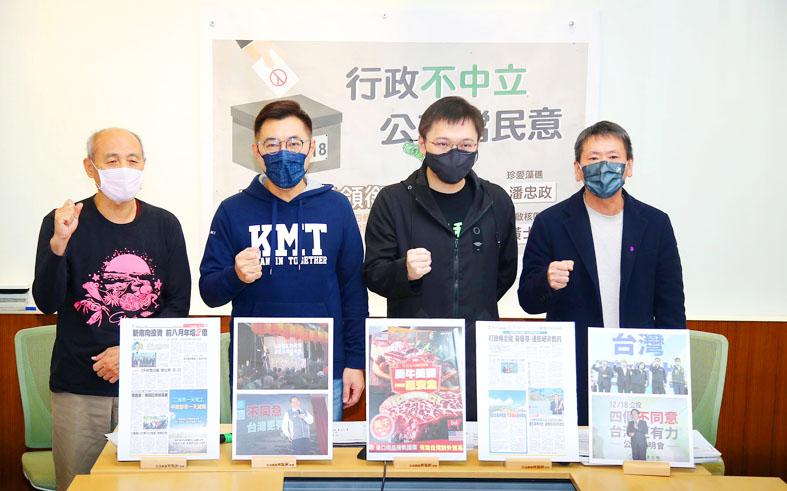The initiators of four Dec. 18 referendum questions yesterday accused the Democratic Progressive Party (DPP) government of contravening the principle of administrative neutrality by using public resources to influence the ballot initiatives.
Chinese Nationalist Party (KMT) legislators Lin Wei-chou (林為洲) and Johnny Chiang (江啟臣), nuclear power proponent Huang Shih-hsiu (黃士修) and environmentalist Pan Chong-cheng (潘忠政) made the remarks at a news conference in Taipei.
Lin initiated a referendum on banning the importation of pork containing traces of ractopamine, while Chiang proposed an item on holding referendums alongside elections. Huang spearheaded a question on activating the Fourth Nuclear Power Plant in New Taipei City’s Gongliao District (貢寮) and Pan initiated an item on relocating a natural gas terminal project to protect algal reefs off Taoyuan’s Guanyin District (觀音).

Photo: CNA
Lin pointed to several actions he said contravened administrative neutrality, such as state-owned CPC Corp, Taiwan and Taiwan Power Co (Taipower) last month buying advertisements in national newspapers opposing the initiative to relocate the liquefied natural gas project.
The Executive Yuan also advertised that pork products containing ractopamine are just as safe as beef products containing the animal-feed additive, he said.
Premier Su Tseng-chang (蘇貞昌) and President Tsai Ing-wen (蔡英文) should not have used government travel funds or requested police protection to attend public events promoting “no” votes in the referendums, he added.
The Executive Yuan is not a person and therefore cannot be an opponent of the referendums, he said.
The Referendum Act (公民投票法) allows the government only to write opinion letters or policy statements, he said.
The DPP is “brainwashing” the country using taxpayers’ money to promote its positions, he said, adding that the government should rein in its conduct to make the referendums fair.
Pan said that the DPP is not being democratic in using administrative resources to fight the referendums, adding that Referendum Act is poorly written regarding contraventions of administrative neutrality.
The government can defend its policies being challenged by ballot initiatives, but it cannot resort to smears and personal attacks directed at the people who initiated the referendums, Huang said.
He added that Taipei City Councilor Miao Po-ya (苗博雅) of the DPP hosting an event about the referendums at National Taiwan University would “taint” university campuses with politics.
The Executive Yuan is not among the registered opponents of the referendums and government officials should limit their actions to writing opinion letters in accordance with the act, Chiang said.
Executive Yuan spokesman Lo Ping-cheng (羅秉成) said the Referendum Act and the Ministry of Civil Service’s interpretation of administrative neutrality indicate that the Executive Yuan can show opposition to referendum questions.
The government has an obligation to defend its policies that the referendums have called into question, he said, adding that Su had participated in public events related to the referendum as part of his government duty and responsibilities.
“There is no question that the government’s conduct is necessary, legitimate and legal,” he said.

A preclearance service to facilitate entry for people traveling to select airports in Japan would be available from Thursday next week to Feb. 25 at Taiwan Taoyuan International Airport, Taoyuan International Airport Corp (TIAC) said on Tuesday. The service was first made available to Taiwanese travelers throughout the winter vacation of 2024 and during the Lunar New Year holiday. In addition to flights to the Japanese cities of Hakodate, Asahikawa, Akita, Sendai, Niigata, Okayama, Takamatsu, Kumamoto and Kagoshima, the service would be available to travelers to Kobe and Oita. The service can be accessed by passengers of 15 flight routes operated by

Alain Robert, known as the "French Spider-Man," praised Alex Honnold as exceptionally well-prepared after the US climber completed a free solo ascent of Taipei 101 yesterday. Robert said Honnold's ascent of the 508m-tall skyscraper in just more than one-and-a-half hours without using safety ropes or equipment was a remarkable achievement. "This is my life," he said in an interview conducted in French, adding that he liked the feeling of being "on the edge of danger." The 63-year-old Frenchman climbed Taipei 101 using ropes in December 2004, taking about four hours to reach the top. On a one-to-10 scale of difficulty, Robert said Taipei 101

MORE FALL: An investigation into one of Xi’s key cronies, part of a broader ‘anti-corruption’ drive, indicates that he might have a deep distrust in the military, an expert said China’s latest military purge underscores systemic risks in its shift from collective leadership to sole rule under Chinese President Xi Jinping (習近平), and could disrupt its chain of command and military capabilities, a national security official said yesterday. If decisionmaking within the Chinese Communist Party has become “irrational” under one-man rule, the Taiwan Strait and the regional situation must be approached with extreme caution, given unforeseen risks, they added. The anonymous official made the remarks as China’s Central Military Commission Vice Chairman Zhang Youxia (張又俠) and Joint Staff Department Chief of Staff Liu Zhenli (劉振立) were reportedly being investigated for suspected “serious

Taiwanese and US defense groups are collaborating to introduce deployable, semi-autonomous manufacturing systems for drones and components in a boost to the nation’s supply chain resilience. Taiwan’s G-Tech Optroelectronics Corp subsidiary GTOC and the US’ Aerkomm Inc on Friday announced an agreement with fellow US-based Firestorm Lab to adopt the latter’s xCell, a technology featuring 3D printers fitted in 6.1m container units. The systems enable aerial platforms and parts to be produced in high volumes from dispersed nodes capable of rapid redeployment, to minimize the risk of enemy strikes and to meet field requirements, they said. Firestorm chief technology officer Ian Muceus said